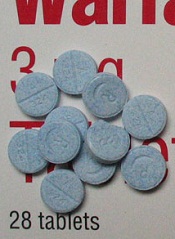
Results of the phase 3 CATCH trial suggest that 6 months of treatment with the low-molecular weight heparin tinzaparin produces similar results as conventional venous thromboembolism (VTE) prophylaxis in patients with active cancer and acute, symptomatic VTE.
The rates of VTE recurrence, overall death, and major bleeding were not significantly different in patients who received only tinzaparin and those who received tinzaparin followed by warfarin.
However, patients who received tinzaparin alone had a significantly lower rate of clinically relevant, nonmajor bleeding.
Agnes Y. Y. Lee, MD, of the University of British Columbia in Vancouver, Canada, and her colleagues reported these results in JAMA. The study was previously presented at ASH 2014.
The researchers enrolled 900 adult patients with active cancer and documented deep vein thrombosis or pulmonary embolism. The patients were enrolled at 164 centers in Asia, Africa, Europe, and
North, Central, and South America between August 2010 and November 2013.
The patients were randomized to receive tinzaparin (at 175 IU/kg) once daily for 6 months (n=449) or conventional therapy with tinzaparin (at 175 IU/kg) once daily for 5 to 10 days followed by dose-adjusted warfarin for the rest of the 6-month period (n=451).
The researchers saw no significant difference in the 6-month cumulative incidence of recurrent VTE between the tinzaparin and warfarin arms—7.2% (n=31) and 10.5% (n=45), respectively (hazard ratio [HR]=0.65, P=0.07).
Likewise, there was no significant difference in major bleeding (HR=0.89, P=0.77) or overall mortality (HR=1.08, P=0.54). Major bleeding occurred in 12 patients in the tinzaparin arm and 11 patients in the warfarin arm. And there were 150 deaths in the tinzaparin arm and 138 deaths in the warfarin arm.
There was a significant reduction in clinically relevant, nonmajor bleeding in the tinzaparin arm (HR=0.58, P=0.004). There were 49 such bleeds in the tinzaparin arm and 69 in the warfarin arm.
The researchers said these results suggest a full therapeutic dose of tinzaparin is safe in cancer patients for up to 6 months, and additional studies are needed to assess whether the efficacy outcomes would be different in patients at a higher risk of recurrent VTE.
This study was sponsored and funded by LEO Pharma (the company developing tinzaparin as Innohep) and had research support from the Sondra and Stephen Hardis Endowed Chair in Oncology Research and the Scott Hamilton CARES Initiative.


